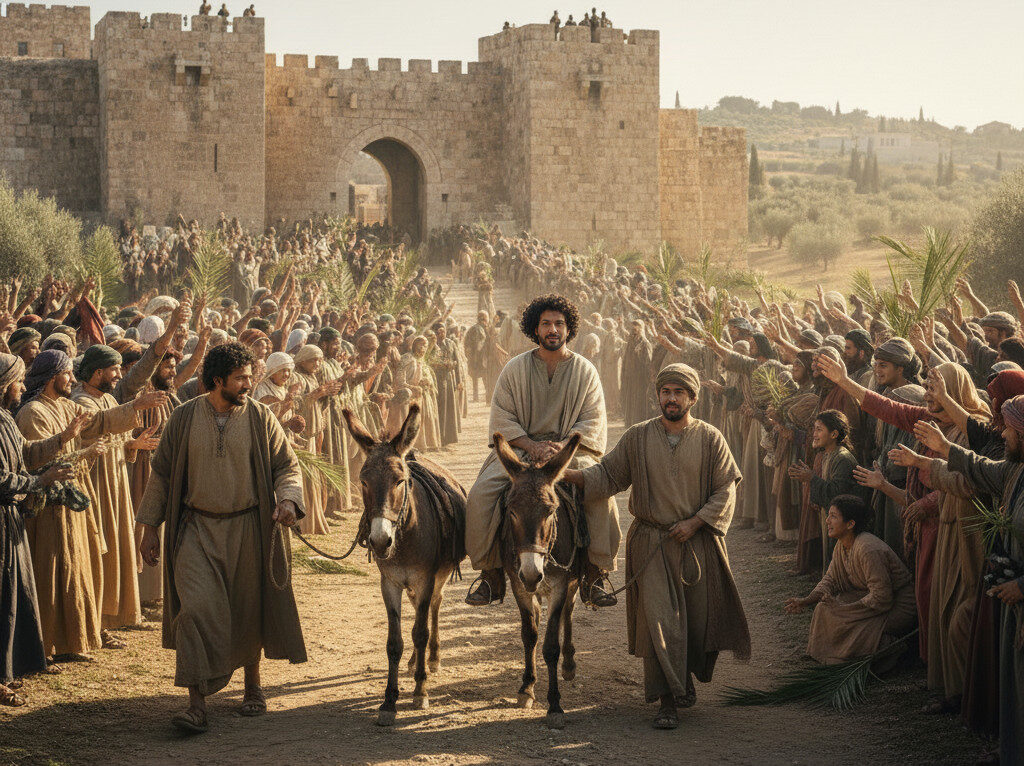Ezekiel 37:15-28 and Elements of God’s Future Promises to Israel
By Dr. Keith Kobelia / January 30, 2026
The Prophet Ezekiel was called to an unusual but important ministry to the captives of Judah in Babylon. Despite his unusual methods (e.g., symbolic acts) and extraordinary visions (e.g., Ezek...
Read More
Why the Promises to Israel Matter Today
By Dr. Daniel Brown / November 15, 2025
Fulfilled Messianic Prophecies from the Book of Zechariah
By Dr. Keith Kobelia / September 15, 2025
Among the most intriguing prophetic sections of the Bible are the prophecies of Zechariah which are contained in the book that bears his name. Zechariah is teeming with Messianic prophecies,...
Read More
The Virgin in Isaiah 7:14
By Dr. Timothy A. Little / July 1, 2025
INTRODUCTION According to the Gospel of Matthew, the virgin Mary was found to be with child of the Holy Spirit. Jesus the Messiah was miraculously conceived, and, several months later,...
Read More
1 Reply
{"slides_column":1,"slides_scroll":1,"dots":"true","arrows":"true","autoplay":"true","autoplay_interval":"5000","speed":"1200","lazyload":""}
Lessons from the Reformation for Biblical Fundamentalists
Posted on by Dr. Ken Rathbun
Fundamentalists today face the challenge of wanting to reach more people but still guard the purity of their churches. In this article Dr. Ken Rathbun, a graduate of Faith Baptist Bible College and Theological Seminary and the academic dean of Fairview Baptist Bible College in Jamaica, gives us insights on this matter from the Reformation period. In his second article he applies the lessons from the Reformation to contemporary fundamentalism.
One of the ironies of the Reformation is that though the Reformers had separated from the Roman Catholic Church, the Reformers attacked other groups of the time for separating from them.
Unity Versus Purity
Posted on by Dr. Ken Rathbun
The same conflict we saw in the Reformation can be seen in contemporary Christianity in North America and the rest of the world. Pastors in Baptist circles today (or heads of institutions or agencies) have choices to make when trying to expand and extend the influence of their church in the community or the constituency of their organizations. Aiming for unity (lowest common denominator of beliefs and/or holy living) will most often result in larger numbers of people, but it does not produce the fruit one might desire.
Toward Expository Preaching
Posted on by Dr. Daniel Brown
Preaching is at the heart of our fundamental Baptist churches. Our churches are blessed with many fine preachers, but there is always a need to issue the call again for excellence in expository preaching. In this issue of the Faith Pulpit, Dr. Daniel Brown, a veteran preacher and teacher of preachers at Faith Baptist Theological Seminary in Ankeny, Iowa, reminds us of the nature of expository preaching and encourages us to hold to a high standard in preaching. In his second article he tackles the question of how long should a preacher preach.
Bonhoeffer and the Scriptures
Posted on by Andy Stearns
Bible-believing evangelical Christians hold a high view of the Scriptures. Many evangelicals also see Dietrich Bonhoeffer as a Bible-believing Christian. Bonhoeffer, however, accepted the prevailing historical-critical views of the Bible in his day. Therefore, we should be wary of calling Bonhoeffer a “Bible-believer.” The following three examples from his writings support this position.
Creation and Fall
In Creation and Fall (1932), an exegesis of Genesis 1–3, we find clear examples of Bonhoeffer espousing the historical-critical view of the Bible. In this work he referred to the Biblical author as the “Yahwist.”1
Bonhoeffer: Approaching His Life and Work
Posted on by Andy Stearns
Many evangelical Christians today seem fascinated with the German theologian Dietrich Bonhoeffer and hold him up as a hero of the faith. Others, however, do not hold him in such high regard. Who was Dietrich Bonhoeffer? Is he someone Bible-believing Christians should look to as a hero or ideal? In this article Prof. Andy Stearns of Faith Baptist Bible College and Theological Seminary examines the life and work of Bonhoeffer. In the second article Stearns evaluates Bonhoeffer’s teachings and his view of the Scriptures.
Choosing Sunday School Curriculum
Posted on by Mr. Don Anderson
Churches today have many choices for their Sunday School curriculum. What considerations should influence a church’s choice of its curriculum resources? Professor Don Anderson of Faith Baptist Bible College and Theological Seminary in Ankeny, Iowa, believes that the key consideration is how well a curriculum helps teachers teach the Bible effectively and thoroughly. In the first article he examines three factors relating to curriculum development that bear upon effectiveness and thoroughness in Bible teaching. In the second article he presents an overview of Sunday School publishers.
An Overview of Sunday School Publishers
Posted on by Mr. Don Anderson
In this article I overview twelve of the major curriculum publishers, especially Baptist publishers, that Faith Pulpit readers might be aware of, have questions about, or consider choosing for their church ministries. The websites linked to each publishing house are the basis for this overview. Visit these websites to find the scope and sequence of each curriculum.
Answers Bible Curriculum
Answers Bible Curriculum (ABC) is produced by Answers in Genesis (AiG) of Petersburg, Kentucky. AiG introduced this curriculum to churches in the summer of 2012.
The Future Kingdom in Zephaniah
Posted on by Dr. Ken Rathbun
The question of the literalness of the prophecies concerning Israel’s future is a major theological issue today. That issue is a key distinction between dispensational and Reformed/Covenant views of eschatology. In this article Dr. Ken Rathbun, a graduate of Faith Baptist Bible College and Theological Seminary and the academic dean of Fairview Baptist Bible College in Jamaica, explores the prophecies related to Israel’s future in Zephaniah 3. His careful interpretation provides a paradigm for interpreting other prophetic passages. In his second article he looks at the implications of a dispensational approach to prophecy.
The Israelite Prophecies: A Cause for Rejoicing
Posted on by Dr. Ken Rathbun
Bible-believers differ in how to interpret prophecy. These differences are not merely academic. They affect a person’s view of the end times, the Old Testament, the future of Israel and the church, and even God Himself. The opposing viewpoints are characterized under the theologies of covenant theology and dispensationalism. From my study of the Scripture, I am committed to dispensationalism so far as it reflects a consistently literal interpretation of the Scriptures. I believe dispensationalism offers the best framework in which to understand how God interacts with various people groups throughout His revealed history.
The Viewpoint of Ecclesiastes: Cynicism or Realism?
Posted on by Dr. Timothy A. Little
The book of Ecclesiastes is a conundrum to many people. Does it express a cynical view of life, or does it describe how a believer is to enjoy life? Our understanding of how to interpret this book makes a significant difference in how we apply it to our lives. In this issue of the Faith Pulpit Tim Little, professor of Old Testament at Faith Baptist Theological Seminary, explores the differing views of how to interpret Ecclesiastes and gives his studied conclusions.



